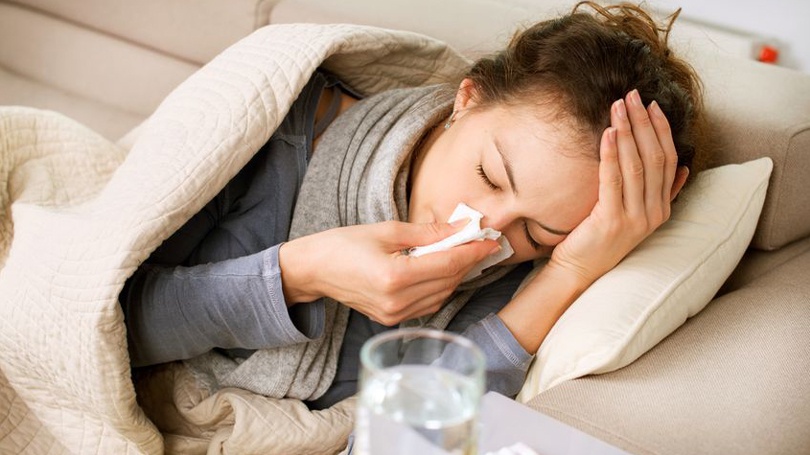Cold or Flu Got You Down? Don’t Forget Your Oral Health!

The average adult comes down with two to three common colds each year. These bouts typically last between seven and 10 days, but you may not experience symptoms over the entire period. During a typical flu season, 8 percent of Americans are affected. These bouts can last between seven and 14 days, and many people experience several days of lingering symptoms after the virus is gone.
Oral health is often underappreciated for the role it plays during these seasons. Good oral hygiene actually makes you less prone to the flu and common colds. In the event you do get the flu or a cold, your oral health can suffer as well. It is a good idea to give your mouth some extra attention, and doing so can actually lessen symptoms and make you feel a little bit better.
Hydrate Using Appropriate Fluids
Dehydration makes you more prone to colds and the flu. Drink lots of water. There is no hard and fast rule concerning how much you should drink. Many health professionals recommend having a water bottle with you throughout your day so that you can sip water whenever you feel thirsty.
When you get sick, dry mouth is the concern. A dry mouth makes you feel terrible, gives you bad breath, and makes you more prone to cavities. It is more difficult to stay hydrated when you have a cold or the flu, and for this reason, you should pay special attention to it. Not only is the sickness drying you out, but the pain relievers, antihistamines, decongestants, and other medications can as well.
Water—and lots of it—remains your best bet for staying hydrated. You may be better soothed by a warmed drink, so you can mix in honey or an essential oil. Tea is also a popular and effective option, and many doctors recommend ginger tea because ginger soothes sore throats and kills rhinoviruses. You can also suck on sugar-free lozenges and drops to promote saliva production and avoid dry mouth.
Opt for Sugar-Free Lozenges and Drops
Sucking on sugary cough drops all day may make you feel better in the short-term, but it can really do a number on your teeth. You are essentially sucking on candy! Be sure to choose a sugar-free product. Also, consider the acidic content, and opt for flavors lower in acids. Sucking on acidic drops all day can be just as bad for you. Drops with menthol and xylitol are particularly mouth-friendly. Most people enjoy the flavor. The menthol soothes, and the xylitol slows the formation of plaque.
Maintain Your Oral Hygiene Regimen
Being laid up with the flu makes it very easy to skip brushing and flossing, but this is also the worst time to do that. Maintaining your oral hygiene will protect your teeth and gums at a time they are particularly susceptible. It will also make you feel better and may speed up recovery. There is also a great deal of evidence that good oral hygiene can make you less prone to pneumonia and other respiratory illnesses.
Be Careful With Toothbrush Hygiene
A contaminated toothbrush is an easy way to get sick, and therefore, you should take care at all times to protect your toothbrush and disinfect it regularly. The CDC warns that viruses can live on a toothbrush for up to 72 hours. Be mindful that once you have the cold and flu, your current toothbrush is contaminated. You may as well use it while you are sick, but you should discard it as soon as you recover. Even when not sick, you should swap out your toothbrush about every three months.
Gargle With a Therapeutic Mouthwash
It can be difficult to keep your mouth feeling fresh when you have the flu or a cold. It is not a good idea to brush more often since that can be hard on your enamel. Instead, swish and gargle with a therapeutic mouthwash. It will make you feel fresher as well as kill much of the bad bacteria in your mouth.
You do not necessarily have to use a commercial product. You can make your own, such as mixing two parts water with one part hydrogen peroxide. Another effective classic oral rinse is to mix one teaspoon of salt into warm water. A study in the American Journal of Preventive Medicine even recommends the regular use of a salt water oral rinse in order to avoid upper respiratory tract infections.
Take Care After Vomiting
Vomiting is often a side effect of the flu, and stomach bile can damage your teeth. You may be inclined to brush right away, but you should wait at least 30 minutes, and, as previously mentioned, you should avoid brushing more than twice a day. Instead, it is better to mix baking soda into water and rinse with that. It will neutralize the acids and tastes and make your mouth feel fresher.
Maintain Excellent Oral Health
It is essential to maintain good oral hygiene throughout the year and pay special attention during the cold and flu seasons. Be mindful that you should not visit your dentist until you have recovered because you can transmit the illness to others. After recovering is an excellent time to have your teeth cleaned and your mouth examined. You can schedule your regular checkup with Jeffrey D. Clark, DDS, at Scottsdale Cosmetic Dentistry Excellence at 480 585 1853.




